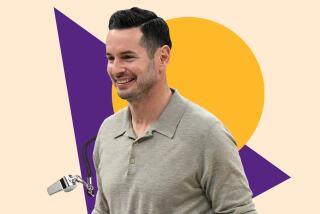In NBA, coaches getting dunked
- Share via
Every year, at least a handful of NBA coaches wind up unemployed through some combination of bad play and bad luck. This season, there has to be another reason.
Inflated expectations? The recession? A revolt against the coaching profession? Not even halfway through the season, NBA coaches have as weak a hold as ever on their jobs.
“I said to somebody, ‘I think there’s a coup out there,’ ” Houston Coach Rick Adelman said.
Adelman was smiling, but this is no laughing matter for his profession. Six coaches were fired before Christmas, 20% of the league’s total and the most at this point in a season, according to the Elias Sports Bureau.
Nine teams changed coaches in the 2004-05 season, a record that could be in jeopardy.
“I just wish I could be in the meeting with the owner when that GM who is firing them is guaranteeing, ‘We’re going to be better by making this change,’ because I don’t see it ever getting that much better,” Denver Coach George Karl said.
Oklahoma City got the pink slips rolling by dismissing P.J. Carlesimo after a 1-12 start, then posted the same record in Scott Brooks’ first 13 games. Injury-plagued Washington (Eddie Jordan) and Sacramento (Reggie Theus) also made changes. So did Toronto (Sam Mitchell), Philadelphia (Maurice Cheeks) and Minnesota (Randy Wittman), teams that expected to be much better than they are.
Coaches always say they’re hired expecting to be fired -- but not this much, this soon.
“It’s pretty consistent the way they’re going about it. Once you start going in the other direction, there’s no miracle trades,” Adelman said. “The classic line I’ve seen a couple of times is, ‘Everybody’s accountable.’ I’ve seen general managers say that, or personnel people. But everybody’s still there but the coach.
“So not everybody is accountable. Even though that’s a nice statement to say, I don’t think that’s the truth. When you’re a coach in this league, you know that’s something that can happen at any time.”
Adelman notes that young coaches often get started with bad jobs. Theus, for example, saw Mike Bibby and Ron Artest traded during his one-plus seasons by a Kings team that is on the decline after Adelman had it near the top of the league earlier this decade.
Karl said some of the problem is the false hopes teams have after summertime moves. The 76ers signed Elton Brand and the Raptors acquired Jermaine O’Neal, and both teams were widely picked to finish in the top half of the Eastern Conference. However, neither club gave its coach much time to get the new changes working -- even though Philadelphia started slowly last season before Cheeks led a second-half surge into the playoffs.
“Most of those teams were expecting to be substantially better than they’re performing,” Karl said. But predictions by writers and team officials are often made before anyone sees how a team jells -- or doesn’t.
“Everybody thinks they’re going to win a championship in the summer,” Karl said.
Jerry Sloan has spent 21 seasons in Utah and enjoys unparalleled security in a league where, according to Elias, there have been 224 coaching changes. He believes the troubling economic times could play a role, with teams desperate to try anything to hold fans who might look elsewhere for entertainment.
The 76ers can’t fill their building in a sports-crazed city. The Kings no longer sell out, not long after they enjoyed perhaps the NBA’s best home-court advantage.
“You can blame it on anything that you want. That might have something to do with it,” Sloan said. “People don’t come to watch your games. I think that’s happened a few times over the years where people are not there, they figure try somebody else and see if they come watch a game.”
Professor Andrew Zimbalist, a sports economist at Smith College, said it’s hard to argue a direct financial link because owners have to take on more salary when they hire a new coach. But he did allow for an indirect connection if an owner of a struggling team suddenly becomes antsy because of hits elsewhere to his portfolio.
“It’s kind of, ‘I’m desperate, I’m looking for anything I can find to turn the momentum around and so I’m going to find another coach,’” Zimbalist told the Associated Press. “But that’s more of a psychological explanation. It’s more saying the owner is anxious, worried, trigger-happy, all of those things, rather than some rational explanation that says, ‘I can’t afford this coach and then I’m going to hire a new one,’ because that only ends up costing him more money.
“So maybe there’s a desperation explanation. It’s psychological. I’ve got to find something to keep people in the seats and since I can’t fire the players, I’m going to fire my coach. And if somehow they think that’s going to make people show up, it could play out that way, but it seems like it’s kind of a longshot.”
Many coaches are naturally bothered by the quick hook given to their colleagues. Cheeks appeared to be the biggest surprise. The Wizards didn’t give Jordan, a perennial playoff, much time despite the absence all season of injured starters Gilbert Arenas and Brendan Haywood. Theus had to go most of the season without his leading scorer, Kevin Martin.
A larger concern is what the coaches think might be a general devaluing of what they do.
None of the teams firing coaches this season hired a proven NBA winner. Ed Tapscott (Washington), Tony DiLeo (Philadelphia), Kenny Natt (Sacramento) and Jay Triano (Toronto) would be hard to recognize outside their own locker rooms. Only Minnesota went with a big name by appointing Kevin McHale -- who’s known for being a great player and far worse executive.
Nor were all even head coaches. Brooks, Triano and Natt were well-regarded assistants, and the others were plucked from the front office.
The moves give the appearance that teams can plug anyone into the coaching position, rather than someone who’s dedicated an entire career to the business.
“It’s disappointing and it makes me sad,” Karl said. “I have a belief that coaching is extremely important and also, extremely difficult. It’s scary how coaches now are losing influence. Seems like they’re losing their territory.”
Adelman believes it will now be harder for coaches to get long-term contracts and wonders if the next step is teams whacking the interim coach too.
New Jersey’s Lawrence Frank is in his fifth full season and is the longest-tenured coach in the East. He points to Sloan and Penn State football Coach Joe Paterno as those who were allowed to weather storms and eventually got their teams back near the top.
“To me, it’s just a choice for management and ownership, is if there’s a deep-seated belief in the guy,” Frank said. “Now maybe obviously if there’s not a deep-seated belief, that’s their right to say we want someone else to run our basketball team.”
Perhaps teams could learn from the Boston Celtics, who ignored calls for Doc Rivers’ firing during a 24-win season in 2006-07. Danny Ainge realized the problem wasn’t the coach. He surrounded him with veteran talent in the Ray Allen and Kevin Garnett trades, and watched Rivers lead his team to a title the next season.
“I had a perfect guy in Danny, who understood what we were trying to do and understood what we were trying to do on the floor,” Rivers said.
That means Rivers, previously fired in Orlando, can enjoy life as a coaching survivor -- for now.
“I guess that’s the silver lining,” he said.
More to Read
Go beyond the scoreboard
Get the latest on L.A.'s teams in the daily Sports Report newsletter.
You may occasionally receive promotional content from the Los Angeles Times.










